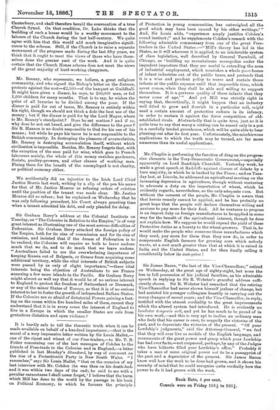Mr. Reaney, who represents, we believe, a great religious community,
and who signed the Bishop's letter on the distress, protests against the cost—E2,500--of the banquet at Guildhall. It might have given a dinner, he says, to 200,000 men, or fed 1,000 children for many months. That is to say, he wishes the -price of all luxuries to be divided among the poor. If the dinner is paid for out of taxes, Mr. Reaney is entirely within his right, though we should not think a dole the best use of the money ; but if the dinner is paid for by the Lord Mayor, where is Mr. Reaney's standpoint ? Does he eat mutton P and if so, why does he not eat bread, and give the difference to the poor ? Sir R. Hanson is no doubt responsible to God for his use of his means ; but while he pays his taxes he is not responsible to the 13ritish community. In destroying the pleasure of accumulation, Mr. Reaney is destroying accumulation itself, without which -civilisation is impossible. Besides, Mr. Reaney forgets that, with the exception of the sum paid for wine, which goes to French labourers mainly, the whole of this money enriches gardeners, florists, poultry-growers, and other classes of working men. Fining them for the benefit of the unemployed is not charity, -or political economy either.


































 Previous page
Previous page